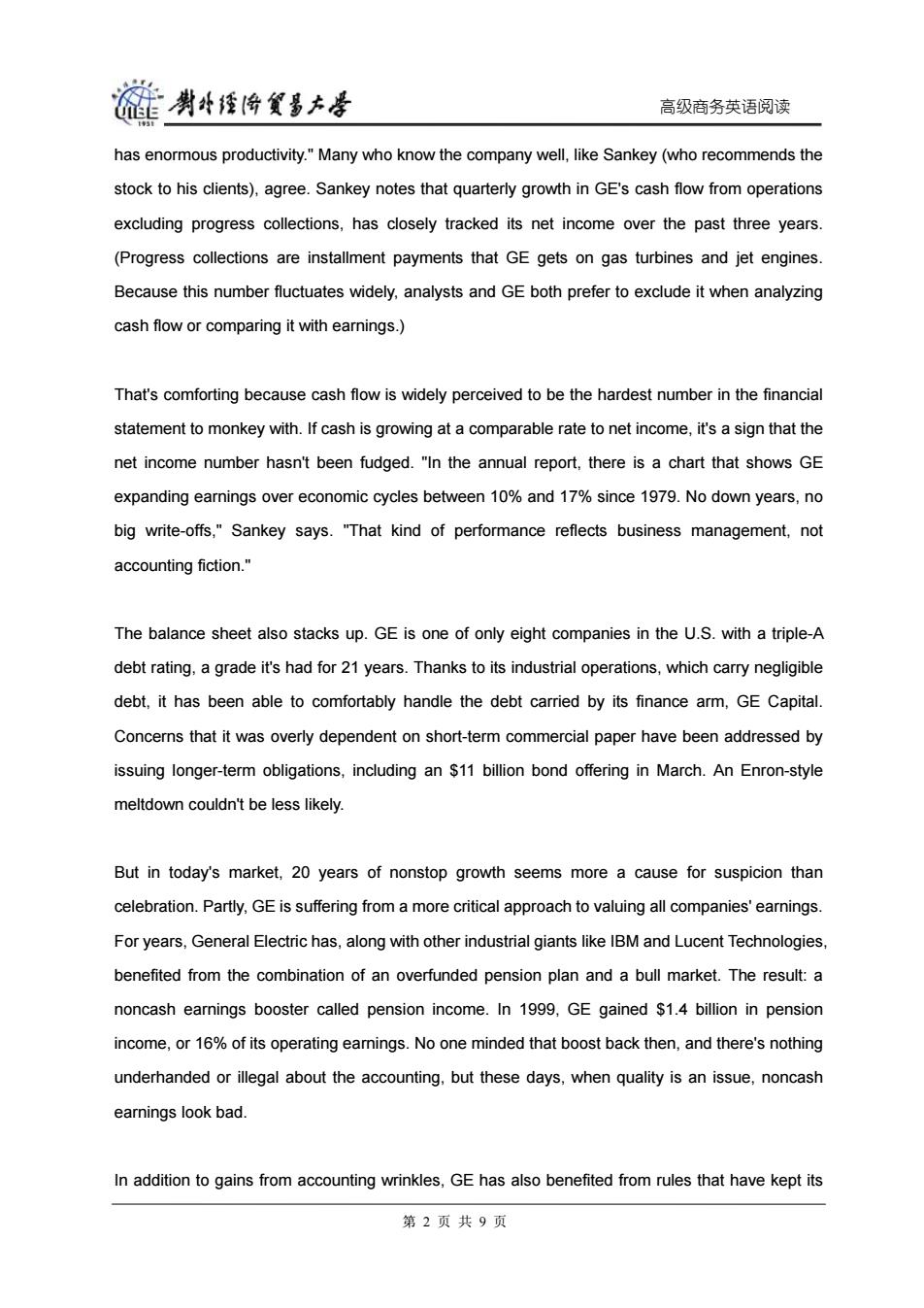正在加载图片...

碰男华经海贸多大号 高级商务英语阅读 has enormous productivity.Many who know the company well,like Sankey (who recommends the stock to his clients),agree.Sankey notes that quarterly growth in GE's cash flow from operations excluding progress collections,has closely tracked its net income over the past three years. (Progress collections are installment payments that GE gets on gas turbines and jet engines. Because this number fluctuates widely,analysts and GE both prefer to exclude it when analyzing cash flow or comparing it with earnings.) That's comforting because cash flow is widely perceived to be the hardest number in the financial statement to monkey with.If cash is growing at a comparable rate to net income,it's a sign that the net income number hasn't been fudged."In the annual report,there is a chart that shows GE expanding earnings over economic cycles between 10%and 17%since 1979.No down years,no big write-offs,"Sankey says."That kind of performance reflects business management,not accounting fiction." The balance sheet also stacks up.GE is one of only eight companies in the U.S.with a triple-A debt rating,a grade it's had for 21 years.Thanks to its industrial operations,which carry negligible debt,it has been able to comfortably handle the debt carried by its finance arm,GE Capital. Concerns that it was overly dependent on short-term commercial paper have been addressed by issuing longer-term obligations,including an $11 billion bond offering in March.An Enron-style meltdown couldn't be less likely. But in today's market,20 years of nonstop growth seems more a cause for suspicion than celebration.Partly,GE is suffering from a more critical approach to valuing all companies'earnings. For years,General Electric has,along with other industrial giants like IBM and Lucent Technologies, benefited from the combination of an overfunded pension plan and a bull market.The result:a noncash earnings booster called pension income.In 1999,GE gained $1.4 billion in pension income,or 16%of its operating earnings.No one minded that boost back then,and there's nothing underhanded or illegal about the accounting,but these days,when quality is an issue,noncash earnings look bad. In addition to gains from accounting wrinkles,GE has also benefited from rules that have kept its 第2页共9页高级商务英语阅读 has enormous productivity." Many who know the company well, like Sankey (who recommends the stock to his clients), agree. Sankey notes that quarterly growth in GE's cash flow from operations excluding progress collections, has closely tracked its net income over the past three years. (Progress collections are installment payments that GE gets on gas turbines and jet engines. Because this number fluctuates widely, analysts and GE both prefer to exclude it when analyzing cash flow or comparing it with earnings.) That's comforting because cash flow is widely perceived to be the hardest number in the financial statement to monkey with. If cash is growing at a comparable rate to net income, it's a sign that the net income number hasn't been fudged. "In the annual report, there is a chart that shows GE expanding earnings over economic cycles between 10% and 17% since 1979. No down years, no big write-offs," Sankey says. "That kind of performance reflects business management, not accounting fiction." The balance sheet also stacks up. GE is one of only eight companies in the U.S. with a triple-A debt rating, a grade it's had for 21 years. Thanks to its industrial operations, which carry negligible debt, it has been able to comfortably handle the debt carried by its finance arm, GE Capital. Concerns that it was overly dependent on short-term commercial paper have been addressed by issuing longer-term obligations, including an $11 billion bond offering in March. An Enron-style meltdown couldn't be less likely. But in today's market, 20 years of nonstop growth seems more a cause for suspicion than celebration. Partly, GE is suffering from a more critical approach to valuing all companies' earnings. For years, General Electric has, along with other industrial giants like IBM and Lucent Technologies, benefited from the combination of an overfunded pension plan and a bull market. The result: a noncash earnings booster called pension income. In 1999, GE gained $1.4 billion in pension income, or 16% of its operating earnings. No one minded that boost back then, and there's nothing underhanded or illegal about the accounting, but these days, when quality is an issue, noncash earnings look bad. In addition to gains from accounting wrinkles, GE has also benefited from rules that have kept its 第 2 页 共 9 页